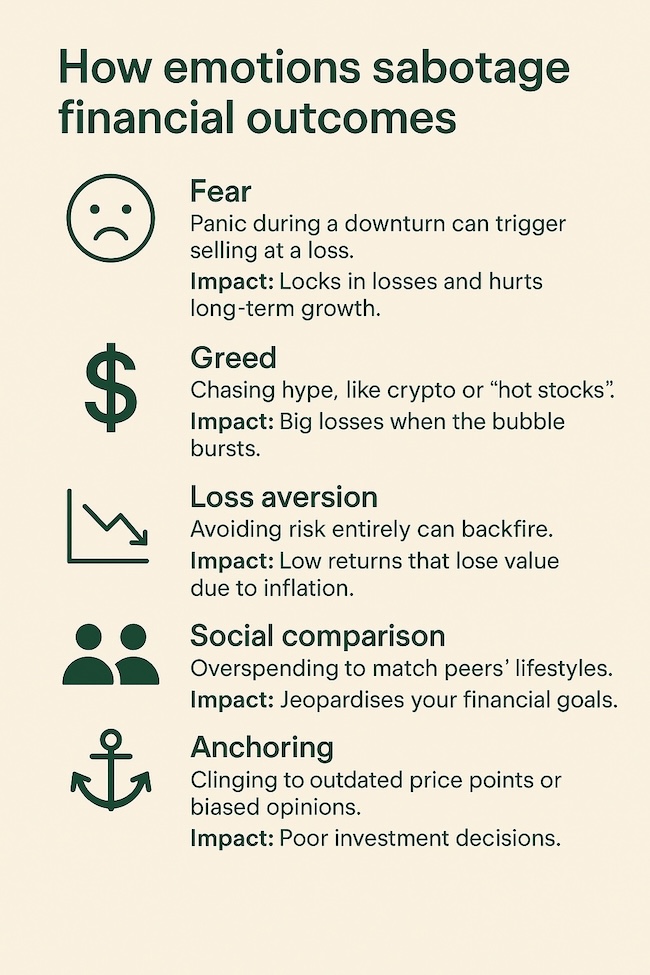Feelings Make for Terrible Investment Decisions
Summary
- Emotions mess with money decisions. Overconfidence, herd behavior, and loss aversion often lead investors to sell low, buy high, or freeze when action is needed.
- Recent market history proves it. From panic-selling during COVID to sitting in cash post-2022, emotional decisions have cost investors big time.
- There’s a fix. Build a plan, automate your investing, and get advice, because reacting emotionally costs more than staying the course.
It’s not the market’s fault – it’s yours. Emotional traps like overconfidence and herd behaviour will sink portfolios before downturns do.

The biggest threat to your investment portfolio isn’t a recession or a bear market. It’s you.
From panic to greed, overconfidence and impulse, mastering your emotions is half the battle.
We tend to think money decisions are mostly rational. But data is only half the story. Fear, pride, shame and even social pressure all play a role in how we spend, save and invest. As Hardi Swart, the founder and managing director of Family Wealth Custodians, writes: “Money is rarely just about numbers. It’s deeply tied to emotions.”
Understanding this is key to avoiding the kinds of mistakes that sabotage long-term wealth creation. And the past five years have provided a masterclass in psychological decision-making.
The early Covid sell-off saw investors panic-sell, only to miss the fastest market rebound in history. That was followed by the mistaken confirmation bias trade of 2021, when market watchers clung to the idea that inflation would be “transitory”, even as central banks began hiking rates.
By 2022, fear had returned. Global markets slid, and investors once again retreated. And then they stayed there. According to Anchor Capital portfolio manager Leigh Crossman, regret aversion kept people on the sidelines: too afraid to lose more, they avoided action altogether – even if it meant missing out on the eventual rebound.
Welcome to the psychology of investing! It’s a mine field of biases. Overconfidence leads us to believe we can time the market better than the pros. Herd behaviour makes us follow the crowd, even when we know better. Loss aversion means we feel losses more deeply than we celebrate gains, and anchoring ties our expectations to past prices rather than current fundamentals.

Benjamin Graham – a pioneering investor often referred to as the “father of value investing” and the author of Warren Buffett’s favourite book, The Intelligent Investor – puts it like this: “The investor’s chief problem – even his worst enemy – is likely to be himself.”
The antidote is structure, discipline and self-awareness. Build a financial plan and automate what you can. Set up regular debit orders into savings or investments to take the emotion out of monthly decisions. Diversify, not because it’s trendy, but because it cushions against sharp moves. And, crucially, pause before acting.

“Don’t react, respond,” Pearl Jam’s Eddie Vedder told a crowd in late 2024, introducing the band’s song of the same name. The advice (from what, in my opinion, is still the best band ever) applies as much to investing as to life. Reacting is instinctive; responding is intentional.
And that difference can determine whether you lock in a loss or ride out the storm.
Family Wealth Custodians’ Swart reminds us that “money is a tool, not a measure of self-worth”. It’s critical to “let strategy guide your decisions”, he says.
Likewise, professional advice acts as a circuit breaker, the financial planner and wealth manager says. When the noise gets loud, having someone objective in your corner can help you stick to the plan.
“Investment management and advice fees are earned in times of adversity,” says Anchor’s Crossman. “During these times, we draw even closer to our clients to guard against the potential emotional and psychological vagaries that take hold of us all and, if left unchecked, will lead to potentially detrimental investment decisions being made.”
And if you’re sitting in cash, afraid to make the wrong move? That’s loss aversion at work. But as Crossman notes, the real risk is not volatility, it’s stagnation. Avoiding risk entirely is often the riskiest move of all.
“Change can be exhilarating and terrifying, but it is unavoidable,” she says. “Being on the wrong side of change could be disastrous for anyone’s investment objectives.”

You can’t eliminate emotion from investing. But you can stop it from running the show. Understand your triggers. Learn your patterns. Create guardrails. And when it comes down to it: don’t react. Respond.
Discover more insights in our blogs
Any opinions, news, research, reports, analyses, prices, or other information contained within this research is provided by an external contributor as general market commentary and does not constitute investment advice for the purposes of the Financial Advisory and Intermediary Services Act, 2002. First World Trader (Pty) Ltd t/a EasyEquities (“EasyEquities”) does not warrant the correctness, accuracy, timeliness, reliability or completeness of any information (i) contained within this research and (ii) received from third party data providers. You must rely solely upon your own judgment in all aspects of your investment and/or trading decisions and all investments and/or trades are made at your own risk. EasyEquities (including any of their employees) will not accept any liability for any direct or indirect loss or damage, including without limitation, any loss of profit, which may arise directly or indirectly from use of or reliance on the market commentary. The content contained within is subject to change at any time without notice
Any opinions, news, research, reports, analyses, prices, or other information contained within this research is provided by an employee of EasyEquities an authorised FSP (FSP no 22588) as general market commentary and does not constitute investment advice for the purposes of the Financial Advisory and Intermediary Services Act, 2002. First World Trader (Pty) Ltd t/a EasyEquities (“EasyEquities”) does not warrant the correctness, accuracy, timeliness, reliability or completeness of any information (i) contained within this research and (ii) received from third party data providers. You must rely solely upon your own judgment in all aspects of your investment and/or trading decisions and all investments and/or trades are made at your own risk. EasyEquities (including any of their employees) will not accept any liability for any direct or indirect loss or damage, including without limitation, any loss of profit, which may arise directly or indirectly from use of or reliance on the market commentary. The content contained within is subject to change at any time without notice.
Subscribe to our Blog
Search all articles
Posts by topic
- Market News & Events
- Easy Community
- Education
- Dividends Update
- Exchange Traded Funds (ETFs)
- Managed Bundles
- Property Investing
- USD Wallet
- Retirement Annuity (RA)
- Cryptocurrency
- Tax Free Savings Account (TFSA)
- International Investing
- Unit Trusts
- New to Investing
- Artificial Intelligence
- EasyProtect
- Shares
- EasyCredit
- Government Bonds
- New Listings
Let Us Help You, Help Yourself
From how-to’s to whos-whos you’ll find a bunch of interesting and helpful stuff in our collection of videos. Our knowledge base is jam packed with answers to all the questions you can think of.








